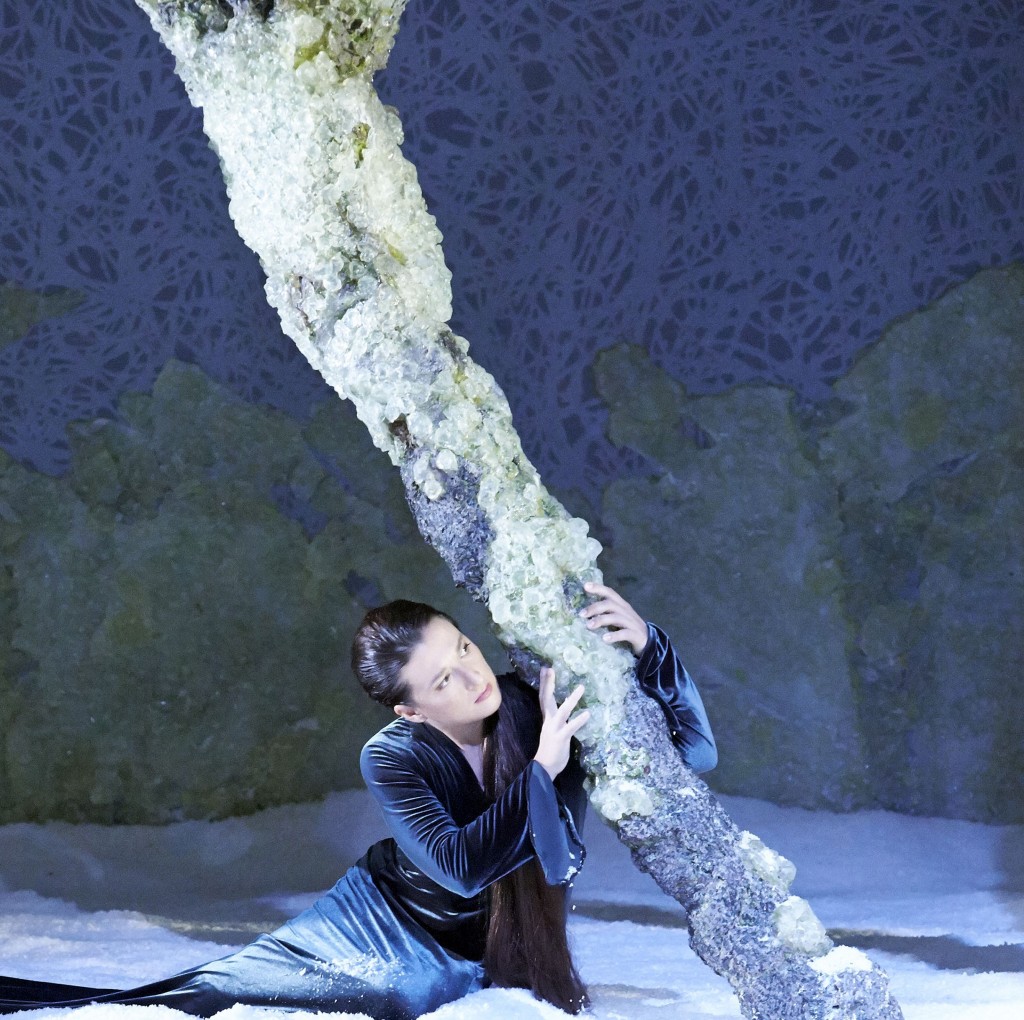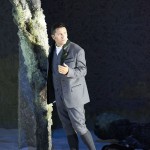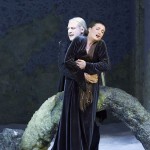 Dvorák’s Rusalka is based on Bohemian folk-lore: the water nymph Rusalka, in love with a prince visiting her lake, wants to become human. But she will lose her ‘voice’; and the prince, cursed, will lose his life. The story could be a parable for the loss of innocence: indigenous peoples corrupted by modern invaders subsuming their cultural identity. The prince has found ‘a dumb woman in the forest’, they gossip . Rusalka, with the prince, remains unknown to him: fearful, and showing no passion. So the prince turns away -with the arrival of a ‘foreign princess’- to his own kind. Rusalka is stranded between alien cultures, neither a woman nor a nymph. Their love is doomed by the ‘curse’ of their incompatibility.
Dvorák’s Rusalka is based on Bohemian folk-lore: the water nymph Rusalka, in love with a prince visiting her lake, wants to become human. But she will lose her ‘voice’; and the prince, cursed, will lose his life. The story could be a parable for the loss of innocence: indigenous peoples corrupted by modern invaders subsuming their cultural identity. The prince has found ‘a dumb woman in the forest’, they gossip . Rusalka, with the prince, remains unknown to him: fearful, and showing no passion. So the prince turns away -with the arrival of a ‘foreign princess’- to his own kind. Rusalka is stranded between alien cultures, neither a woman nor a nymph. Their love is doomed by the ‘curse’ of their incompatibility.
But operagoers visit Rusalka for Dvorák’s ravishing music; and would be reassured by Vienna State Opera’s traditional, late 19th century, modern-tweaked, production, directed by Sven-Eric Bechtholf. Rusalka (Olga Bezsmertna) begins staring out over a balcony, beneath, her father the wood goblin is being teased by water nymphs. Rolf Glittenberg’s set, on two levels with withered trees, cleverly depicts an underground, underwater world. In her aria , Rusalka’s feeling sad; she’d like to leave these watery depths: be human beneath the rays of the sun. ‘You want to be human?‘, her father (Günther Groissböck) interjects.- They have something called an immortal soul. ‘Don’t crave for a sinful soul’, he warns. But she craves love: sings of the man she sees bathing-without his clothes- in her presence. She knows that if she were a woman , she would embrace him and he would return her kisses. Erotic, voyeuristic? But it’s sung by Bezsmertna with unaffected innocence. Her wood nymphs would weep for her every night, warns her father. (Would they, the Prince is the very good-looking Piotr Beczala.) She will be lost forever, he forbodes. Groissböck- young Austrian, in demand- has a superlative baritone.
Now the opera’s hit number, that went viral for Dvorák (in the 1890s). In her aria Rusalka invokes the moon. You travel the world, looking down on the homes of mankind. ‘Oh moon, tell me where my beloved is, whisper to him that he may embrace me in his dreams, oh silver glittering moon…’ Bezsmertna sings movingly, without affectation, so plaintively. It’s meltingly sad.
‘Poor pale Rusalka’ visits sorceress Jezibaba (Janina Baechle). She pleads for a magic potion to release her. Baechle, huddled in dark furs, creeps around the stage picking up dead birds. She has elemental forces. ‘Is that all you’ve come for?’ Baechle’s is a formidable mezzo-soprano (a Wagnerian who sang Erda here recently.) If she fails to find human happiness, she and her lover will be cursed. Would she be voiceless for the price of her love?- Rusalka, defiantly, she’ll gladly be mute. (She thinks her human soul will overcome such obstacles.)
 A voice is heard off-stage: Don’t shoot! We see a huntsman (baritone Mihail Dogitari.) The Prince knows she’s nothing but a spirit: will fade away. ‘Stay with me my faint spirit’; his hunt is over. Beczala is outstanding; his tenor has great power, but purity. Beczala leads in with Rusalka’s motif : Divine sweet dream! Bezsmertna’s Rusalka is in a white satin shift; he, Beczala, in a silver grey suit with traditional loden collar. The sisters sing one of their number is missing.
A voice is heard off-stage: Don’t shoot! We see a huntsman (baritone Mihail Dogitari.) The Prince knows she’s nothing but a spirit: will fade away. ‘Stay with me my faint spirit’; his hunt is over. Beczala is outstanding; his tenor has great power, but purity. Beczala leads in with Rusalka’s motif : Divine sweet dream! Bezsmertna’s Rusalka is in a white satin shift; he, Beczala, in a silver grey suit with traditional loden collar. The sisters sing one of their number is missing.
Act 2’s brilliantly lit stage is backed by a frosted window. The gamekeeper and cook sing about the strange creature the prince came across in the forest. The woman cannot speak, is quite pale. May they be protected from such ‘ill-fated love’.
Beczala sings ‘for days you’ve been laying at my side in a daze’. He stares into her eyes, but she’s enveloped in a dream. She, Bezsmertna, is laid out on a black velvet-covered platform. Why is he filled with anguish? Nevertheless, even if cold as ice, he must make her his. She, singing to the audience, feels no love for him, but cannot bear another to take her place.
The ‘foreign princess’ arrives, and intervenes reminding him of his duties: even a bridegroom is a servant. ‘And your beloved remains silent! Does she speak to you only with her eyes?’ Mezzo-soprano Monika Bohinec, brunette in a claret velvet gown, sequined midriff, and wearing a tiara. He’ll quickly make up for his neglect, he promises. (Rusalka looks on powerless, quivering.) Though his heart may belong to you, the honour is mine, boasts Bohinec’s princess.
Bezsmertna waltzes around the stage in a white wedding dress. Amazingly, and significantly, Rusalka doesn’t sing in this scene. The loss of her voice signifies the sacrifice of her individual self: the suppression of her cultural identity.
In this staging, a choreographed dream-like sequence, she stands overlooking a burlesque scene in which a rather plump prince (Beczala) in long-johns, jumps on the Princess (Bohinec) laid out in white on the ‘marriage bed’. Rusalka haunts them, in a prolonged motion, as if invisible: she’s a sprite after all.
The Goblin upbraids her. ‘You have fallen for the dazzling beauty of the world, alas!‘ For all her human form, a nymph’s blood flows in her veins. Groissböck’s goblin- in dark coat, with long platinum-white hair – forewarns her ‘Alas, poor Rusalka, human nature will become a curse to you. (Meanwhile, the human world is portrayed in a chic tableau. The Prince’s household in black outfits, bride and groom splayed out.)
 ‘Woe is me for betraying you,’ returning to her father, she’s found her voice again. Bezsmertna sings, hitting tremendous high notes. He has fallen for another, a wild , human beauty, and abandoned his poor Rusalka. Groissbock tears apart the wedding dress in a rage. Bezsmertna, powerful, impassioned, yet admits, ‘I was born of the cold water and have never known fire! I am cast out by you and lost to him.’ She’s neither woman or nymph: can neither live or die!
‘Woe is me for betraying you,’ returning to her father, she’s found her voice again. Bezsmertna sings, hitting tremendous high notes. He has fallen for another, a wild , human beauty, and abandoned his poor Rusalka. Groissbock tears apart the wedding dress in a rage. Bezsmertna, powerful, impassioned, yet admits, ‘I was born of the cold water and have never known fire! I am cast out by you and lost to him.’ She’s neither woman or nymph: can neither live or die!
Meanwhile, the bitchy Princess sings asking ‘Where has she flown to, the one without a voice and a name. Bohinec back in her claret gown, taunts, will he embrace that sleepwalking beauty of his. Beczala sings enigmatically, how ‘he would break his vows to love only you’, singing of Rusalka’s cold, white beauty. Rusalka stands back of stage, as if reaching out to him. ‘Follow your chosen one to the depths of hell!’ thunders Bohinec.
Act 3 and again the double-levelled stage, upper storey balcony window looking out at the human world. Rusalka now sings from the underworld, bewailing her happy youth, condemned by her transgression to pine away in the cold waters. Didn’t you enjoy the kisses and find company in the human world, Jezibaba cajoles. Only human blood -his -can purge her and remove her curse. Excellent: chillingly sung by Baechle. But Rusalka rejects her: would rather suffer eternal torment. But he must know happiness!
She’s the outsider. A chorus of women sprites sing of how they will shun her; she will never be able to return to their world. The Goblin sings, it was the Prince who betrayed her: he’ll be avenged. There’s an enchanting, but problematic, scene in which the sprites hover over a body, their hands bathed in blood.
The Prince calls out to his ‘little white deer’; sings, night after night, he searches for her deep in the forest. Beczala, incongruously dressed – black frock -coat, silver trousers- like an old-fashioned crooner: Speak to me voiceless forest.
She sings, my dearest one, do you still recognise me?- He, if you are dead, kill me. If alive, save me!’ Suspended between worlds, she sings, she was once his beloved, now can only bring him death. A will-of-the wisp, her womanhood is defiled. If she were to kiss him now, he’d be lost forever. But he will pay for his deceit. Beczala, sings pleadingly, ‘Kiss me!’ He dies, petrified, as if metamorphosing into the trees.
His death was in vain, deems the Goblin. But Rusalka appeals to God to have mercy on his soul. Bezsmertna, who stepped in at short notice, was magnificent; and warmly applauded.
Tomas Netopil inspired idiomatic playing from Vienna State Opera orchestra and Chorus in a performance sung in Czech, authenticating Dvorák’s score. Vienna Staatsballet dancers added to a very special occasion. P.R. 10.09.2014
Photos: Olga Bezsmertna (Rusalka); Piotr Beczala (the Prince); Olga Bezsmertna and Günther Groissböck (Water goblin); theme image Olga Bezsmertna and Piotr Beczala
(c) Wiener Staatsoper /Michael Pöhn
viennaoperareview.com
Vienna's English opera blog

Good post! We will be linking to this particularly great content on our site. Keep up the great writing.
Very good blog post. I definitely love this website. Keep it up!
Way cool! Some very valid points! I appreciate you penning this article and also the rest of the website is really good.
Very nice write-up. I definitely appreciate this site. Stick with it!
I could not resist commenting. Perfectly written!
Wonderful article! We are linking to this particularly great content on our website. Keep up the great writing.
Excellent article. I certainly love this site. Keep writing!
Just commenting to show my support. Your opinion is well structured Nice job!
Your dedication to quality is remarkable as well as your hard work as well as devotion have actually been excellent. We are so happy for all that you do!